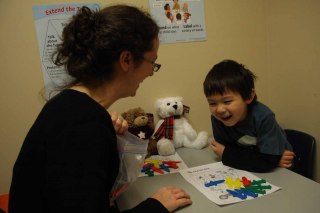Today Caleb had his last speech therapy session with Karen, a Speech-Language Pathologist who has been in his life since he was 19 months old. Now that he is 5 and on his way to kindergarten he has “graduated” out of the Early Intervention Program. It feels like the end of a an incredible journey that has been both challenging and rewarding.
The start of this journey was bittersweet, and a hard life lesson in parenthood. You never want your child to be less than perfect, and yet sometimes you have to follow your instincts that tell you something is wrong. I remember thinking that Caleb was different than other toddlers. He wasn’t picking up words like they were, or when he would aquire a word, he’d lose other ones. I remember racking my brain to try and figure out when he stopped being able to call me mama. When he had his 18 month immunizations I talked to the health nurse about my concerns, and already had an ASQ filled out that showed his communication skills to be at risk. We were sent to audiology and put on the Community Speech waitlist. We were also invited to participate in the Early Language Stimulation courses for parents. It was during these courses that I met an old collegue who did me the favor of doing a quick assessment of Caleb duirng our course practice session. She concurred with my instincts and suggested we call QA for both speech and motor planning difficulties. She was the first one who said that there was a possibility he has Apraxia. I left her office with Caleb, now knowing I had been right, that my parental instincts were right. By the time I got to the car I was crying and eventually I had to pull over to a side street to call Adam. Even though I already knew, it was extremely hard to have someone confirm that something was wrong.
A few weeks later Karen showed up at our house, and I watched as each week she would try to coax sounds out of Caleb. Some weeks he was silent, and it would take half an hour for him to make a controlled voluntary sound. It was painful to watch those first sessions, and to see how hard he had to struggle to control his muscle movements to make verbal sounds. It was also painful to realize how much more delayed he was than I had originally thought.
As the months went on, Caleb learned how to start controlling sounds, and improving his motor planning. He learned some simple sign language to help facilitate his functional communication needs. I cried the first time he was able to look at me and say “Ov oo mama”. Those are still the best three words I have ever heard anyone say.
Caleb was also seen by Occupational Therapy, as he was having trouble with motor planning – the ability to plan out how to move his body and execute the movement functionally. This was causing difficulty with his sound production and also with his gross and fine motor skills. Again, I had a hard time watching how hard some simple motor movements were for him.
Eventually Caleb was also seen by physiotherapy and psychology. At three he still was not able to jump and he had an extreme phobia of haircuts. He had incredible cognitive abilities, but had also learned the fine art of distraction. He would use his silly behvaiour to get himself out of therapy work and would charm his way into getting people to do things for him. We learned that peer influence worked well for him, and he did great following the lead of his friends. At preschool he went from being an observer to a participant to a leader.
Just after his fourth birthday, we met with his Early Intervention team to discuss his final year with them, and another possible diagnosis. His OT, Carolyn, and PT, Donna, did a joint assessment and we realized that Caleb’s motor planning difficlties were consistant with Developmental Coordination Disorder. The team was so good at helping us through this process. We knew that having a “label” for Caleb, while heartbreaking, was also neccessary for helping to access services and therapy plans.
Throughout all this, we have come to love and accept all his differences. We realize that Caleb needs extra practice and extra encouragement to do things. We know that he has to work twice as hard as his peers. So many times he has melted with fustrations and so many times I have also fallen apart with him. There are days when a lot of yelling and a lot of tears are shed. But we also have days where he makes us laugh so hard we forget about everything else. He spends his days singing, telling stories and teaching his little brother how to communicate.
We are so proud of how far he has come. He can run and jump, climb and ride a bike now. He can hold long conversations and most of what he says can be understood. He can tell us how he feels, what he wants and what he remembers. He is such a different boy than the one that first started with the Early Intervention Program. We are so lucky that he received all the early assistance, and our family got so much support.
We also know Caleb still has lots of work left to do, lots of speech patterns left to learn and many more challenges left ahead of him. Kindergarten is a whole new journey he is about to begin, with new supports and a whole new school who will get to learn his quirks, and will have to learn to understand his speech. But I know he can do it. We can do it.
I am so proud of you Caleb. Happy graduation… I hope one day you can look back on this and realize how much harder you worked to get where you are. I know you are going to go far.
For more information on Apraxia visit: www.apraxia-kids.org
For more information on Developmental Coordination Disorder visit: http://dcd.canchild.ca/en/
